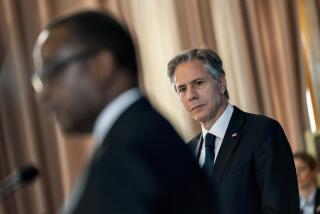More Teams Sent to Liberia as Bush Promises He’ll Be Prudent
- Share via
PRETORIA, South Africa — President Bush vowed Wednesday to guard against over- deploying U.S. troops around the world even as he dispatched new military assessment teams to Africa to help him finalize the precise American role in peacekeeping efforts in Liberia.
“We won’t overextend our troops -- period,” Bush said during a joint news conference with South African President Thabo Mbeki.
Bush reiterated his pledge of some form of U.S. participation in enforcing the current cease-fire in Liberia, but he stopped well short of committing combat forces to the civil-war-racked West African nation.
The president suggested that U.S. troops might confine their mission there to conducting training sessions and providing technical support.
“I think our money has helped train seven battalions of peacekeepers amongst African troops. And it’s a sensible policy for us to continue that training mission -- so that we never do get overextended,” Bush said.
“And so one of the things you’ll see us do is ... reinvigorate the strategy of helping people help themselves by providing training opportunities,” he said. “I think we’ve trained five Nigerian battalions, if I’m not mistaken, one Senegalese.... But it’s in our interest that we continue that strategy ... so that we don’t ever get overextended.”
The latest dispatch of assessors appears all but certain to further delay a final decision by Bush on Liberia.
“It’s going to take some time for the assessments to come in, and they’ve got some thorough work ahead of them,” White House Press Secretary Ari Fleischer said Wednesday.
In an interview with BBC World News, Secretary of State Colin L. Powell sounded an equally noncommittal note about deployment of combat troops to Liberia. “It’s a judgment we have to make. The president is considering all of his options,” Powell said.
It was Defense Secretary Donald H. Rumsfeld, testifying Wednesday on Capitol Hill, who revealed Bush’s directive to the Pentagon to send small teams to some member nations of the Economic Community of West African States to determine the readiness of their soldiers to back a peace effort in Liberia.
“Until the assessment teams come back, it seems to me that we will not have a good grip on what we would propose to the president” for Liberia, Rumsfeld told the Senate Armed Services Committee.
This week, an initial U.S. military team arrived in the Liberian capital, Monrovia. The group, which encountered a delay at a roadblock controlled by troops loyal to Liberian President Charles Taylor, has begun visiting camps for thousands of people displaced by the unrest.
The additional teams ordered by Bush, according to Rumsfeld, would help “determine the readiness of the ECOWAS forces and the extent to which they may or may not be ready to deploy, and over what period of time, with what type of equipment, having had what type of training.”
In his Pretoria news conference, Bush reiterated his demand that Taylor step down. The Liberian leader, who has been charged with war crimes by an international court, has accepted an offer of asylum from Nigeria but has not indicated when he would leave.
Bush, on a five-day tour of Africa, is to visit Nigeria on Saturday. He arrived in Pretoria, South Africa’s administrative capital, late Tuesday night.
On Wednesday, Bush and Mbeki met before their wives joined them for lunch.
Though Mbeki opposed the U.S.-led war in Iraq, all seemed forgiven as he and Bush lavishly praised each other’s leadership in promoting bilateral trade and combating terrorism and regional instability.
Bush toured a Ford Motor Co. plant Wednesday afternoon and then dined with U.S. and South African business executives.
Today, Bush goes to Botswana, where he is to promote his $15-billion global anti-AIDS initiative as well as trade.
The president and his wife also were scheduled to tour the Mokolodi Nature Reserve there.
More to Read
Sign up for Essential California
The most important California stories and recommendations in your inbox every morning.
You may occasionally receive promotional content from the Los Angeles Times.













